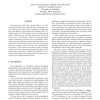Free Online Productivity Tools
i2Speak
i2Symbol
i2OCR
iTex2Img
iWeb2Print
iWeb2Shot
i2Type
iPdf2Split
iPdf2Merge
i2Bopomofo
i2Arabic
i2Style
i2Image
i2PDF
iLatex2Rtf
Sci2ools
113
Voted
AVSS
2006
IEEE
2006
IEEE
Activity Topology Estimation for Large Networks of Cameras
Estimating the paths that moving objects can take through the fields of view of possibly non-overlapping cameras, also known as their activity topology, is an important step in the effective interpretation of surveillance video. Existing approaches to this problem involve tracking moving objects within cameras, and then attempting to link tracks across views. In contrast we propose an approach which begins by assuming all camera views are potentially linked, and successively eliminates camera topologies that are contradicted by observed motion. Over time, the true patterns of motion emerge as those which are not contradicted by the evidence. These patterns may then be used to initialise a finer level search using other approaches if required. This method thus represents an efficient and effective way to learn activity topology for a large network of cameras, particularly with a limited amount of data.
Activity Topology | AVSS 2006 | Effective Interpretation | Non-overlapping Cameras | Signal Processing |
Related Content
| Added | 10 Jun 2010 |
| Updated | 10 Jun 2010 |
| Type | Conference |
| Year | 2006 |
| Where | AVSS |
| Authors | Anton van den Hengel, Anthony R. Dick, Rhys Hill |
Comments (0)

